Expedition to the ancestors. Egyptian pyramid of power
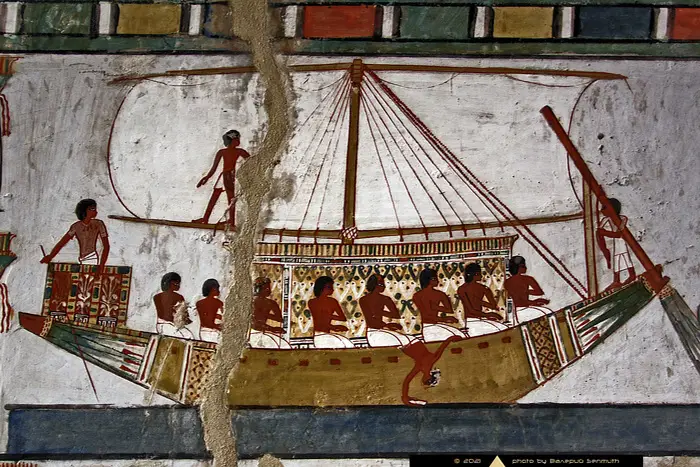
Fresco from the tomb of Menna, who bore the title “Scribe of the fields of the Lord of both lands, Upper and Lower Egypt.” Served under Thutmose IV or Amenhotep III. His burial (TT69) is located in the Valley of the Nobles on the west bank of Luxor. Photo by Valery Senmut
Or the twinkling of the rising moon?
But come to your senses!
Pyramids rise
Before you, black and scary.Nikolay Gumilyov "Egypt"
People and story. We continue our virtual journey into the past. We have already become acquainted with many of its interesting aspects, but until now we have not touched upon a very important point, namely, the structure of state power in Ancient Egypt, which emerged after the unification of Upper and Lower Egypt into a single state.
In general, any state power is a pyramid: at the top is the ruler, and at the bottom are those whom he rules to one degree or another. But how exactly was this rule carried out, what did the ancient pharaohs focus on when exercising their powers of power?
This is what our story will be about today. Moreover, the Egyptians themselves will tell us about this, and the source of information will be papyrus number 1116A, stored in the State Hermitage in St. Petersburg. It was translated at one time by our pre-revolutionary Egyptologist V.S. Golenishchev, it is called: “The teaching of the Heracleopolis king to his son Merikara.” Well, it was compiled... a long time ago, in the XNUMXst century BC.
So, what does the king of Heracleopolis instruct his royal son in?
Let's start with his calls to strengthen his personal power, they are very revealing and still relevant today:
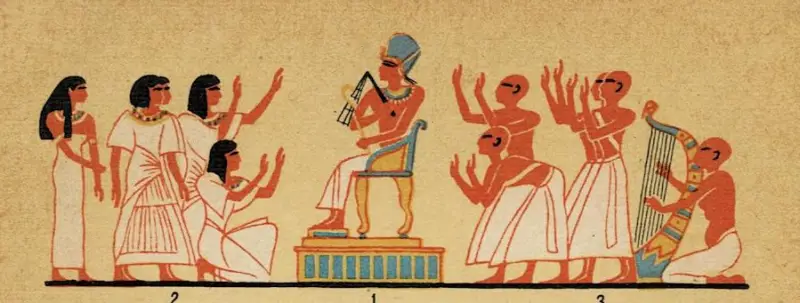
The “Great Pyramid” of state power in Ancient Egypt: at the top is the pharaoh, his entourage, high priests and servants. Yes, yes, some fan-bearer for the king or a musician who delighted his ears was a very important figure in the palace hierarchy, and often not so much played as he talked to everyone...
However, he very wisely reminds his son not to overdo it with the executions of all those who “harm”: “Do not kill - it is not good for you, but punish with blows and imprisonment.” Although it is clear that we are not talking about the rebels here, but about the attitude towards ordinary Egyptians, so to speak, the people expressing discontent.

Scribes, warriors and artisans who sculpted statues of the pharaoh were at the second level of government in Egypt
It is clear that with all his divinity, the pharaoh could not do without assistants. And in relation to these people, Merikara is given advice of a completely different nature:

Peasants were the basis of the country's well-being, and all land suitable for agriculture belonged to the state, that is, to the pharaoh
It is clear why the emphasis is on young people: young people are ambitious, brave, they will die on the battlefield shouting “Long live Pharaoh... (insert the correct name!), and not wheeze “Farewell, wife.” Well, those who prove their loyalty on the battlefield can be given a fraction of their wealth - the Egyptian pharaohs understood this very well.

Slaves from prisoners of war appeared in Egypt only during the era of the New Kingdom and the campaigns of the pharaohs in Asia and Nubia
He advised him to build temples and tombs with a lot of good advice regarding domestic and foreign policy, emphasizing not so much that they are useful to the deities, but emphasizing the fact that ... “detachments of workers are useful to their master.” To protect against attacks from outside, he also advises his son to build fortresses in the north to protect against nomads, whom he calls, however, “despicable Asians.”
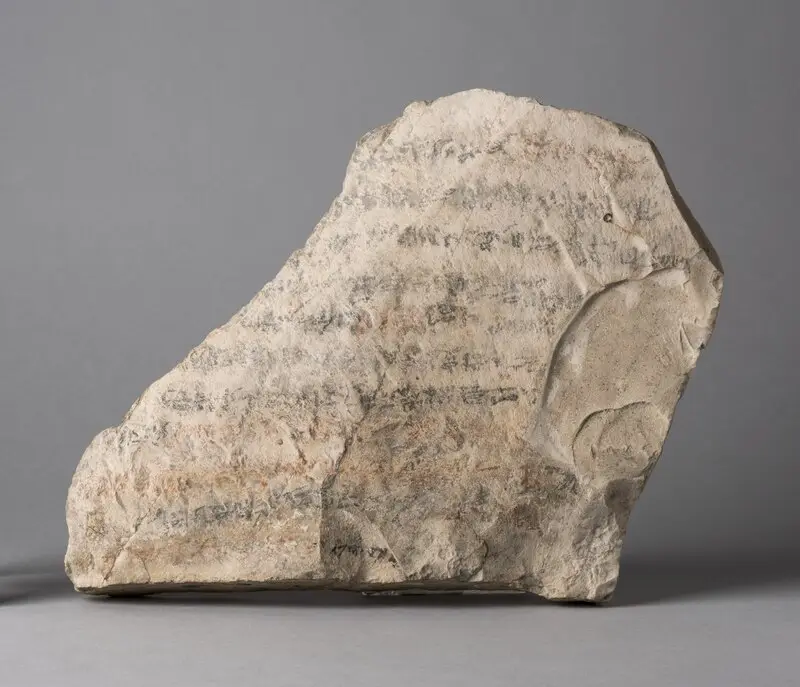
The texts of the teachings were even written down on such fragments. Ostrakon of the XIX dynasty with a fragment of the “Teachings of Akhtoy”. Egyptian Museum, Turin
The king’s truly philosophical attitude towards wealth is interesting:
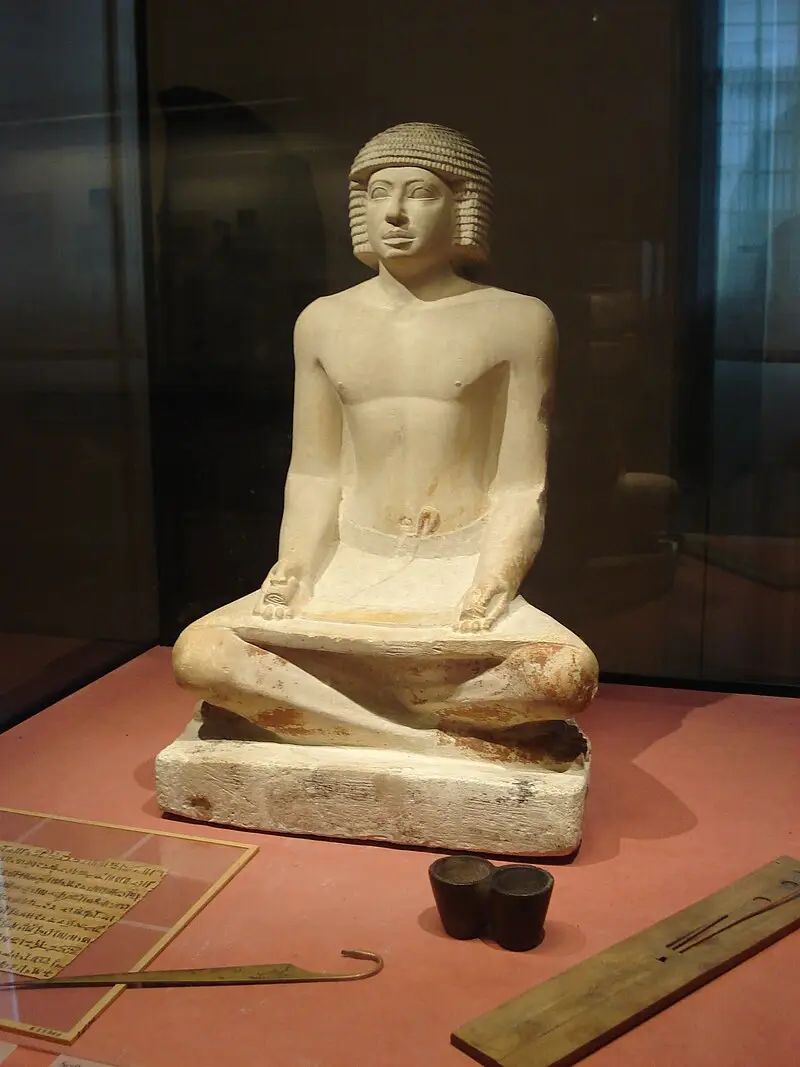
A seated scribe with an unfolded papyrus on his lap (2500–2350 BC). Louvre
Moreover, the fact that the Instructions pays so much attention to the rebels is clear evidence that the supreme power in Egypt was by no means unshakable and did not stand like a rock. That is, the pharaoh had to fear everyone and everything: both the “tops” and the “bottoms.”
And, it should be noted that the king wrote this teaching for a reason. A century passed - and in Egypt there was a conspiracy against Pharaoh Amenemhet, the first pharaoh of the XII dynasty. At night, he was subjected to a sudden attack, and the conspirators (just like in the story of our Russian Emperor Paul the First) even managed to break into the royal bedroom, and only thanks to a lucky chance did the king survive.
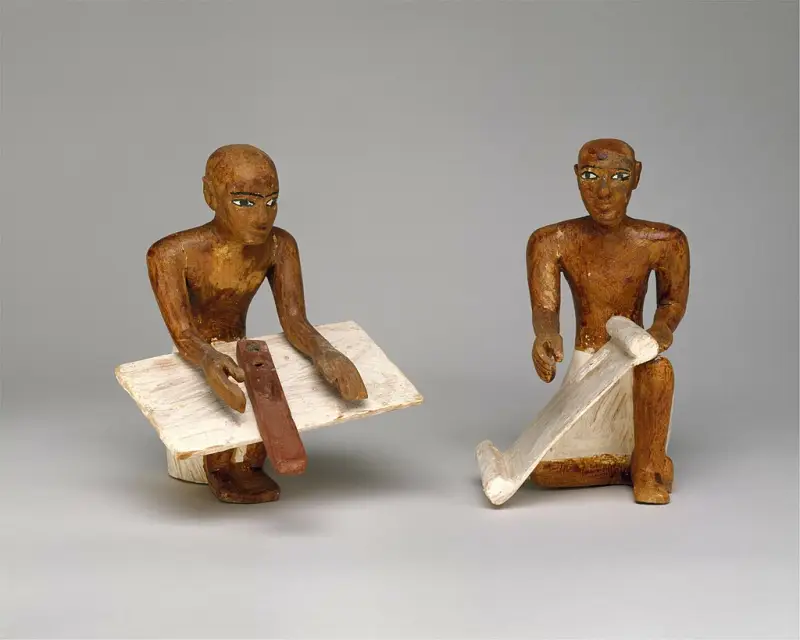
Figurines of scribes from the tomb of Meketre. Metropolitan Museum of Art, New York
Who these people were is unknown to us. But in the “Teachings” compiled on the occasion of this conspiracy, this is what is said about them:
“Those who ate my bread rebelled against me,
Those to whom I gave my hand rose up against me.”
Mentuhotep further calls himself “the pacifier of the one who rebels against the king.” However, the pharaoh always had at his disposal not only those harboring anger against him, but also truly exemplary executors of his will.
Many tombstone inscriptions have been preserved on the walls of mastabas that belonged to the nobles of the pharaohs of various dynasties, and they all write about the same thing in them. Here, for example, is the inscription left behind by the nomarch of the city of Siuta:
“Every official was at his post. There was not a single one fighting, not a single one shooting an arrow. A child was not killed near his mother and a commoner near his wife. There was no intruder... and no one to commit violence against his home.”
“When night came,” it is written in another place, “he who slept on the road gave me praise, for he was as if he were at home. Fear of my warriors was his protection."
“Fear of warriors” was a very important pillar on which the Egyptian state was based. The easiest way to keep the people of Egypt in obedience was through armed force and its use in the harshest forms. No wonder one of the major nobles wrote so directly:
“I was a terror to the crowd. I taught the foreigner how to perform his duties. I bent the prisoner. I forced the rebel to recognize his own mistakes."
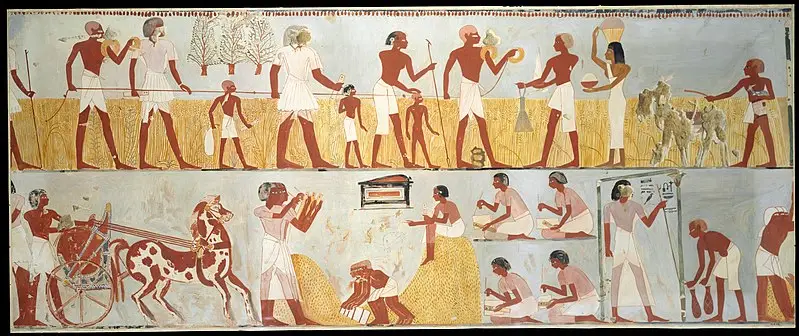
Harvest. Tomb of Menna. Above shows how the scribes measure the field by pulling the rope. Menna himself arrived in a chariot and, standing under a canopy from the heat, watches the progress of the work
There was also a well-thought-out system of punishments that allowed “the rebels to admit their mistakes.”
The following types of sentences are known:
• justification;
• deprivation of liberty;
• confiscation of property or part thereof;
• sent to hard labor (to quarries or mines, which almost always inevitably led to death);
• corporal punishment or self-harm (for example, a certain Sahatuemnefer lost his ear by a court verdict);
• the death penalty, and in Egypt they did not chop off heads, but simply... flogged a person with papyrus stalks, after which ordinary salt was rubbed into the wounds!
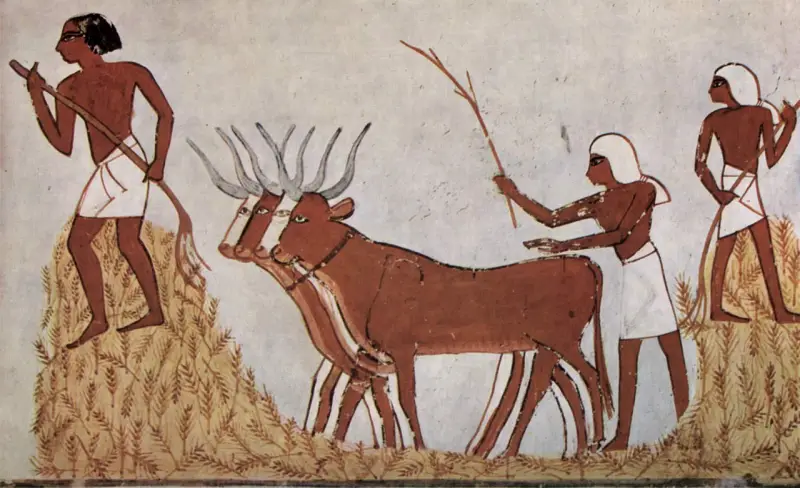
Bulls and peasants. Menna's Tomb
There was also a completely original punishment, called the “curse of memory,” for especially serious offenses, according to which the names of the criminals were removed even from the cartouches of the pharaohs” (for example, this was what they did with the heretic pharaoh Akhenaten).
Also, the criminal could be hanged or burned to the ground without being given a proper burial, so that he would lose the afterlife (for example, this is what they did with Prince Pentaur, who attempted to kill the pharaoh.
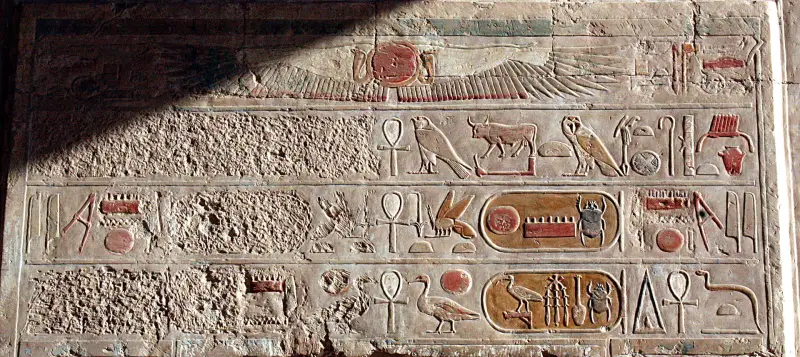
Knocked down inscriptions in the Djeser-Djeseru temple to curse the memory of the reign of Queen Hatshepsut
Well, if we, again, look at the “Egyptian pyramid of power”, we will see the following picture.
At the very top is the pharaoh - the living god, the guarantor of order and justice. Below him was the chati - the vizier and the right hand of the pharaoh. Then came many hatis - governors of nomes or nomarchs.
The judiciary was also organized very interestingly in Egypt. It was carried out by a judge, and the chief judge was appointed by the pharaoh himself.
He was followed by advisers, investigators and secretaries-scribes at courts of all levels. We owe much to them for the amazing number of documents describing the Egyptian litigation in every detail.
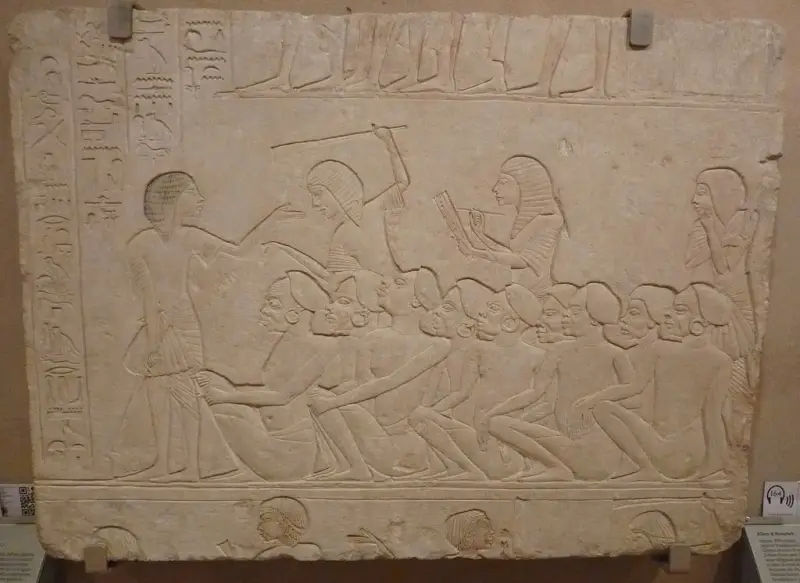
Scribes copying Nubian prisoners. Relief from the tomb of Horemheb, at Saqqara, during the reign of Tutankhamun, 18th dynasty. Archaeological Museum of Bologna, Italy
By the way, scribes in Ancient Egypt belonged to a privileged class, and all because, in addition to the ability to write and read hieroglyphs, they also had extensive knowledge of arithmetic and had access to archival materials and historical documents. They were also teachers, accountants, translators, scribes, writers and administrators.
And they also had their own pyramidal hierarchy: managers, mentors, inspectors, assistants. At the lowest positions were the scribe-secretaries, while at the top were the advisers to the pharaoh himself.
Thus, Clement of Alexandria reported that scribes were the third class of the Egyptian priestly caste.
Interestingly, Greek historians called Egyptian scribes harpedonaptes (“stringers of rope”), apparently because they used a stretched rope to measure the areas of land and immediately wrote down the resulting data in scrolls.
That is why in another “Teaching”, which belonged to a certain Akhtoy, something like the following was written: “Look, there is no position free from the leader, except [the position of] scribe - he himself is the leader!” (“Teaching of Akhtoy, son of Duauf, to his son Piopi”).
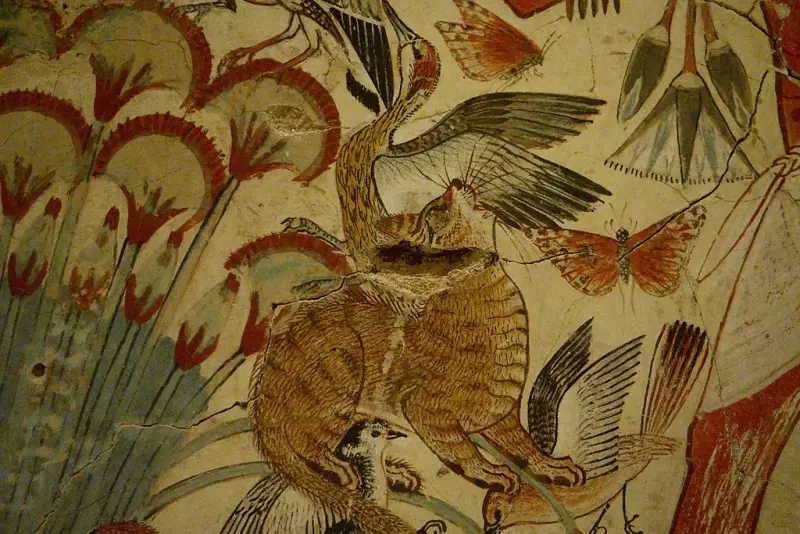
Just a very beautifully depicted hunting cat... Tomb of the dignitary Nebamun
By the way, the Egyptian scribes even had their own divine patrons - the god of time and writing, Thoth, and the goddess of writing, Seshat.
Information